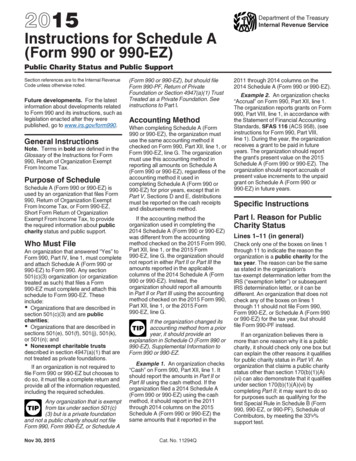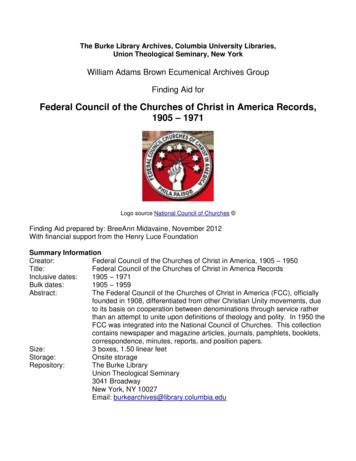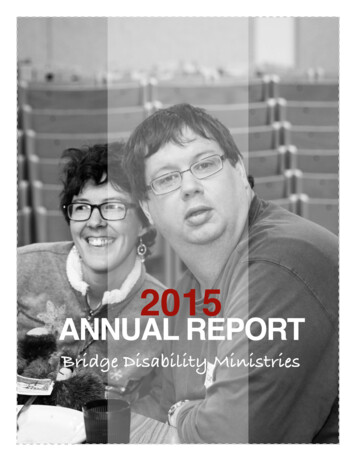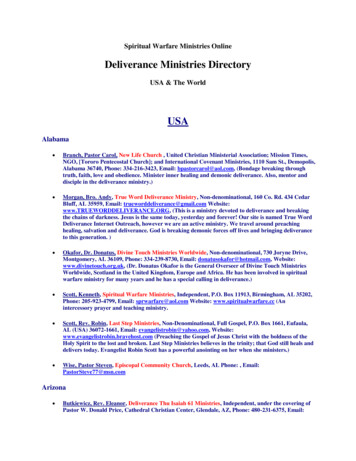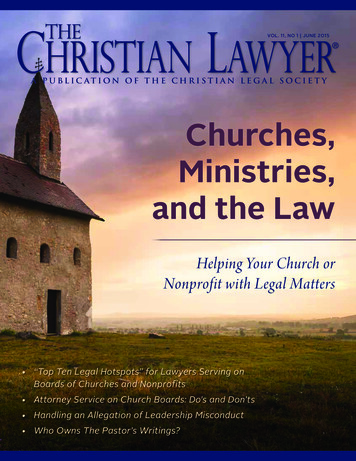
Transcription
VOL. 11, NO 1 JUNE 2015A P U B L I C AT I O N O F T H E C H R I S T I A N L E G A L S O C I E T YChurches,Ministries,and the LawHelping Your Church orNonprofit with Legal Matters “Top Ten Legal Hotspots” for Lawyers Serving onBoards of Churches and Nonprofits Attorney Service on Church Boards: Do’s and Don’ts Handling an Allegation of Leadership Misconduct Who Owns The Pastor’s Writings?
F ROM THE E XECUT I V E D I R ECTO RA Lawyer’s UsefulnessWDavid Nammo,Executive Directorand CEOithout fail, every time a pastor sees acopy of this magazine, they always askif “Christian lawyer” is an oxymoron. As theCEO of the largest Christian lawyers’ association, I often have to bite my tongue in response.Yet the reality is that many pastors not onlymisunderstand true “vocational calling,” butalso they cannot imagine what lawyers can offer in ministry.It is because of these interactions that I oftenclaim that the church only has two uses forlawyers: first, as a punchline for a joke fromthe pulpit or second, to put him or her on thechurch board in case the church needs free legal advice. And when I repeat that statement togroups of lawyers around the country, there areoften nods of approval.Either way, it is the second “use” that is thetheme of this magazine. Many of us Christian lawyers are sitting on church or nonprofitboards but know very little about nonprofitlaw. We are usually general practitioners and,like any good lawyer, know that we can get upto speed on a particular body of law if needed.The purpose of this issue is to offer those of yousitting on that church or nonprofit board a littleprimer. Some of the more universal issues thatarise in these settings could be easily addressedDesign & ProductionPerceptions StudioAdvertising OfficeChristian Legal Society8001 Braddock Road, Suite 302Springfield, Virginia 22151Editorial Emailclshq@clsnet.orgFor advertising inquiries, emailmemmin@clsnet.org.Editor-in-ChiefDavid NammoAdvertising in The Christian Lawyer does not implyeditorial endorsement. Opinions expressed in TheChristian Lawyer are solely the responsibility ofthe authors and are not necessarily those of theeditors or members of the Christian Legal Society.in a few good articles, which are included here.As lawyers, in an advisory context or as a boardmember for a church or nonprofit, we neverwant to have a situation where we look backand say “if only we had .” It is cliché, but prevention and preparation are the best ways toavoid complications that can damage not onlyan organization, but also hurt those who trustthat organization the most.The churches and nonprofits see themselves asrepresentatives of Christ to our communities,our culture, and those they serve. And as such,they want to be above reproach in all they do.And as lawyers, who are risk averse by nature,we are the ones who can help them draw theboundaries, set up the procedures, and helpthem safely and wisely keep watch over theirflock.So I am thankful for the CLS nonprofit lawyers who have contributed to this issue. Theyare lending us their expertise and their advice,free of charge. And hopefully, the churchesand nonprofits who have appointed us to theirboards will benefit as well. So please take thetime to read through this issue – if not for you,for those who are relying on you – from theCEO and pastor all the way down to the childin Sunday school.Manuscript PolicyWe encourage the submission of articleand story ideas by our readers. For a copyof our editorial guidelines, please writeor send an e-mail to memmin@clsnet.org.Unsolicited manuscripts and poetry arenot accepted. A query letter must be sentfirst to memmin@clsnet.org describinga proposed manuscript. Any unsolicitedmanuscripts will not be returned.The Christian Lawyer isa publication of:Christian Legal Society8001 Braddock Road, Suite 302Springfield, Virginia 22151Main Office: 703-642-1070 Copyright 2015. Christian LegalSociety. All rights reserved.
IN THIS ISSUEChurches, Ministries, and the Law:Helping Your Church or Nonprofit with Legal Matters “Top Ten Legal Hotspots” for Lawyers Serving on Boards of Churches andNonprofits, by Daniel Hebda and H. Robert Showers, Esq. . . . . . . . . . . . . . . . . . . . . . 3 Attorney Service on Church Boards: Do’s and Don’ts, by James H. Pluymert . . . . . 8 Handling an Allegation of Leadership Misconduct, by Theresa Sidebotham . . . . . . 11 Who Owns The Pastor’s Writings? by Leslie Ruiter . . . . . . . . . . . . . . . . . . . . . . . 16CHRISTIAN LEGAL AIDScaling Up Our Dreams. . . . . . . . . . . . . . . . . . . . . . . . 19Ken LiuCENTER FOR LAW AND RELIGIOUS FREEDOMA Short Primer for Understanding RFRAs. . . . . . 21Kim ColbyATTORNEY MINISTRIESNew Season, But Same Calling . . . . . . . . . . . . . . . 24Brent AmatoFROM THE PRESIDENTChurches and Religious Nonprofitsin Trouble, but God is Able . . . . . . . . . . . . . . . . . . 27H. Robert Showers, Jr.CLS Attorney Chapters List. . . . . . . . . . . . . . . . . . 28
Churches,Ministries,and the LawHelping Your Churchor Nonprofit withLegal Matters2THE CHRISTIAN LAWYER JUNE 2015
“Top Ten Legal Hotspots” for Lawyers Serving onBoards of Churches and NonprofitsBY DANIEL J. HEBDA AND H. ROBERT SHOWERSIf you are “the lawyer” on a church or nonprofit Board of Directors, then you probably know that such a designation often comes with the unwelcome expectation that, despite youractual area of legal expertise, all potential legal liabilities arenow covered just by your dignified presence. As a competentlawyer, however, you also know that this is no truer than theexpectation that a talented orthopedic surgeon can competently cure a brain tumor.It is paramount that you are aware of which “hat” you are beingasked to wear: board member or legal counsel to the organization. To help educate your board on how these principles apply to the specialist body of law governing churches and nonprofits, we have provided short summaries of the top ten legalissues facing churches and nonprofits.The steps below should help you begin to see areas of need inyour church or nonprofit. And remember, the safest and bestadvice is to work closely with a knowledgeable nonprofit attorney in many of these areas.1. Governance: the Devil’s in the details.While incorporation provides significant protection, especiallyfor leadership, governing documents are often boilerplate andnot well-crafted. We have seen very nasty disputes that stemfrom unclear or poorly-worded governing documents or simply from misunderstood governance structures and principles.As an attorney on the church board, be on the look-out for atleast two key elements to minimize any frustrations. First, dothe articles and bylaws clearly describe the actual practice anddoctrine of the church? When disputes arise among membersor leaders, one of the first questions is always “what do thedocuments say?” Second, do your governing documents takefull advantage of the religious “shield” available to churches?The best way to analyze this is to look at whether a neutral IRSagent, by reading your church’s governing documents and observing their practices, could easily conclude that your choicesand decisions are made based on your sincerely-held religiousbeliefs. If the answer to this is no, particularly on an issue thatis potentially “on the line” legally (like discriminating againstan employee or refusing to use donated money for a certainWWW.CHRISTIANLAWYER.ORGproject), your church will have a much harder time justifyingits tax-exempt existence.2. Membership and leadership: plan fordisagreement.Good governance easily spills over into helping resolve disputes over membership and leadership. Keep in mind four keypoints. First, make sure your governing documents (articles, bylaws, constitution, etc.) have binding and mandatory Christianmediation or arbitration clauses. A disgruntled member whocannot sue the church in civil court will resolve the dispute in amuch healthier and confidential way than a disgruntled member who can make a public spectacle in open court with secularjuries, judges and media. Check your state’s laws on the language needed to enforce such clauses in court if they are challenged. Second, ensure that your statement of faith addressesthe key doctrinal points that your church practically emphasizes. If, for example, you would never allow a transgender whoidentifies as a Christian into membership, but your statementof faith or member covenant says nothing about sexuality orgender, you may be stuck. If you know you would disciplineand possibly excommunicate a member for some kind of misbehavior, think carefully about whether that behavior is tied toyour sincerely-held religious beliefs and how your statement offaith shows that. Third, make sure that contract approval andaccess to and use of funds are clearly circumscribed in yourgoverning documents and policies. This is a particularly stickywicket when a new pastor or elder signs unauthorized agreements or tries to make changes and access funds that are partof a church’s long-standing heritage. Fourth, make sure yourgoverning documents state clearly how authority is delegatedin leadership so that committees and boards are not collidingon who has the authority to do what.3. Same-sex marriage: don’t wait on thisone.Homosexuality in the church may well become, if it is not already, the defining issue of faith communities in this century.This is a sweeping issue that will have implications in member-3
ship, governance, leadership, and almost every other aspect ofchurch life. Obviously, your church must first decide what itsdoctrinal position will be. Defining marriage as between oneman and one woman will likely open your church up to attackin the not-to-distant future. Make sure that your statement offaith and governing documents include a discussion of the definition of Biblical sexuality, complete with Scripture references. This lays the groundwork for everything. It establishes thatyour church’s position on homosexuality is firmly grounded inits sincerely held religious beliefs and nowhere else. Second,make sure that this statement clearly governs how you admitmembers, hire employees, and take on volunteers. This ismost readily done through the policies, covenants, applicablemanuals, and third party use and special event (like weddings)agreements.4. Para-church and for-profit activities:good ideas with hidden consequences.Many excellent fundraising ideas involve pursuing some sortof venture that brings the potential for a nonprofit or churchto realize income that is unrelated to their tax-exempt purpose.While income is not a bad thing, this type of income generatesa tax, otherwise known as the “Unrelated Business IncomeTax” (UBIT). This can happen in a variety of situations, froma nonprofit youth camp that leases its facilities for weekendbusiness conventions, to a church that sells Christmas trees attwice their cost to raise money for a mission trip, to a churchthat leases its parking lot to a local university during the schoolyear. First, familiarize yourself with the following elementsthat trigger a UBIT: 1) the income is from a trade or business; 2) the trade or business is regularly carried on; and 3)the income is not substantially related to the exempt purposeof the entity. Second, know the exceptions. For example, whileUBIT generally applies to income from land, there are exceptions available when the use is substantially related to yourexempt purpose and when the property is not debt-financed.If your church or nonprofit wants to undertake an unrelated (or even a related) business venture on a larger scale, youshould also consider the possibility of conducting that businessthrough a wholly-owned subsidiary entity. This can help avoidnegative tax consequences, such as losing your tax exempt status, while balancing the control and separation of assets neededto keep tax-exempt status. The details of setting this up, however, should involve competent counsel, because owning a forprofit can implicate the IRS rule governing what percentage ofyour activities must be charitable to retain your tax-exemption.Trusted Advisers to Non-ProfitsThe attorneys at Wagenmaker & Oberly focus their practices on the crucial nuances of nonprofit law. Our attorneys’ interests in exempt organizations are not merely legal in nature.Each attorney has been personally involved in nonprofit activities through the years. Thefirm’s desire to help and assist nonprofits achieve their goals stems from our attorneys beliefin the fundamental value of the nonprofit organization, and its place in our world.53 W. Jackson Blvd, Suite 550, Chicago IL 60603 312.626.1600 wagenmakerlaw.comSponsored by Wagenmaker & Oberly, thankful supporters of CLS in Illinois and nationwide.4THE CHRISTIAN LAWYER JUNE 2015
5. Third-party facility use: planning aheadof time helps you serve your communityeffectively.If your church or nonprofit chooses to use its facilities to servethe community, there can be a number of potential problemsif it does not take proper steps at the outset. Letting someoneonto your property is in many ways an intimate act and shouldonly be done with careful planning. One of the first mistakesmany churches make is allowing use of their premises without any written agreement as to the terms or the types of usesthat are permitted and prohibited. For example, if a churchwouldn’t allow gay marriages to be performed on its premises,it cannot expect to enforce that restriction unless it has that restriction included in a facilities use policy, or somehow tied tothe terms controlling the use of the property. Allowing use ofyour premises can also impact your tax exemption and may endanger your status if you dedicate too much use to non-exemptpurposes if that use is not securely tied to your exempt purpose. Your church may also come under the purview of yourstate’s public accommodation non-discrimination laws. Although these laws often have exceptions for religious organizations, more and more states are prohibiting discrimination byplaces of public accommodation based on sexual orientation.6. Child and youth protection: what youdon’t know does hurt you.Youth and child-care programs often form a significant part ofa nonprofit or church’s ministry focus. It is easy to get involvedwith serving children in the community, but much trickier todevelop the proper safeguards to shield your program from liabilities. There are at least four key steps that you should implement. First, you must have a program to screen your workersand volunteers. Getting people to work with youth can be achallenge, so it is tempting to welcome with open arms anyonewho is willing to help and to check them out later. After you’veconducted proper background and reference checks, makesure to train your workers properly. If volunteers and employees don’t know how to report suspected abuse or even spotit, your liability increases significantly. Third, make sure youproperly supervise your workers. Training is not enough—supervision ensures the policies and plans you have in place areactually being followed. Finally, have in place protocols thatdictate exactly how to report and investigate alleged abuse.When the allegation is made, you need to have a system to address that allegation quickly and clearly, without hesitation.WWW.CHRISTIANLAWYER.ORG7. International ministry and fundraising:not all that glitters is gold.More and more frequently, ministry is being done throughpartnerships and relationships developed with overseas organizations and individuals. U.S. churches and nonprofitsare working to raise funds in the U.S. that can be sent tosupport those laboring internationally. They can run afoulof laws restricting the transfer of funds to such organizations by a U.S. tax-exempt organization. Because the IRShas no way of knowing whether the recipient of the money sent overseas is a true exempt organization, it is muchmore skeptical about international transfers. Cases aboundof well-meaning U.S. donors who are hoodwinked by scamartists around the globe who seem genuine but ultimatelydivert funds to their private benefit. Add to that the addedscrutiny of the Office of Foreign Asset Control, looking forpotential violations of trade embargoes and sanctions, andit can be highly risky for a church or nonprofit to send money—whether large or small sums—to foreign recipients.As a general rule of thumb, however, the IRS is looking forfactors that demonstrate the U.S. charitable organization’scontrol over the use and direction of the funds. Any suchtransfers have to be structured so that it is apparent that theUS charity is not just a temporary resting place for funds asthey exit the country.8. Church health insurance: sadly, harderthan it has to be.Thanks to the Affordable Care Act (ACA), it is becomingmore and more difficult for churches and small nonprofitsto navigate the nuances of providing healthcare for theiremployees. Some churches can’t afford the cost of compliance, and some can’t afford the actual insurance premiums.Some practices that used to be perfectly acceptable can nowget your church in big trouble. For example, many churchesused to provide their employees, in lieu of a full health-careprogram, tax-free reimbursements of their individual healthcare premiums. Under the ACA, those reimbursements areno longer tax-free, and employers can be severely penalized for failing to withhold taxes. The ACA now also prevents employers from providing a Health ReimbursementArrangement or Flexible Spending Arrangement (HRA orFSA) to employees without providing full healthcare coverage through a group plan.5
9. Employment issuesAlthough churches are entitled to many unique exemptionswhen it comes to employment, they also sadly have a reputation for making ill-advised employment decisions and running their human resources departments without knowledgeable legal counsel. For example, churches expose themselvesto significant liability when they grant housing allowances,tax-free, to “pastoral staff ” members who are not licensed, ordained, or commissioned as ministers. This practice is especially dangerous given the recent challenges to the housing allowance and the subsequent increased scrutiny. Churches canalso be slapped with penalties for classifying as “independentcontractors” employees who are subject to the control of thechurch in performing their jobs. Counsel your church to payspecial attention to their employment practices and to investin legal review of their employee classifications, pay practices,fringe benefit programs, and policies and manuals.dom, and personal injuries. The top ten claims that we haveidentified, however, are issues that, in our interaction withchurches and nonprofits, cause crises and occur frequently.Handled properly, these claims can be resolved or settled before a lawsuit results and never see the light of a courtroom.As legal and cultural landscapes continue to shift, risk management for churches and nonprofits is no longer an optional planning tool, used only by those with extra time and resources. It is a necessity. Without it, churches and nonprofitsrun the risk that their beloved ministry may one day come toa grinding and unexpected halt when the IRS questions theircharitable receipts, or when a member announces he is a homosexual, or when a trusted child-care volunteer becomes anabuser. Your position as a lawyer on the board of your churchor nonprofit may place unwanted expectations on you, but itgives you a unique opportunity to educate your board and takesteps to set their ministry up for long-term success.Daniel Hebda is an associate at the NOVA/DC10. Violence in the Church: prevention isthe best medicine.Twenty years ago no business administrator or facilities director for a church or nonprofit would even contemplate, letalone address, the need for creating a comprehensive safetyand security team. Times have changed, and the idea thatchurches are off-limits to violence has disappeared as the number of violent activities on church property increases everyyear. To address this with your church, start by conducting areview of your security, your neighborhood, and the risks involved. Appoint a security team and consider what steps (suchas a security system) will help mitigate your risk. Educate yourmembers and your security team on how to handle requestsfor help and what information to collect and how to respondwhen approached by a stranger in need. Taking preventativesteps, establishing policies, and conducting due diligence cango a long way to mitigating liability in court should any incident occur, particularly if your church or nonprofit is in an obviously dangerous neighborhood.branch of Simms Showers LLP. He representschurches and nonprofits on matters involvingemployment, tax-exemption, real estate, riskmanagement, international missions, and complex corporate structures. He also representsclients on business and civil litigation matters involving personalinjury, real estate disputes, breach of contract, and various stateagency and administrative claims. Mr. Hebda joined Simms Showers in 2012 after graduating from Regent University School of Law,where he served on the Moot Court Board and the InternationalLaw Review.”Rob Showers originally formed Simms ShowersLLP in 2002 with Virginia and Maryland officesand now serves as the managing partner at thethriving VA/DC branch of a 12-lawyer firm. Hehas a long history of litigation and appellate workbut is presenting focusing on serving nonprofitsand churches as well as faith-based businesses. Before entering private practice in 1989, Mr. Showers acted as Deputy Assistant Attorney General and served as Executive Director of the U.S. Department of Justice’s Child Exploitation and Obscenity Section (CEOS).Mr. Showers has started and run several nonprofits, including theNational Law Center for Children and Families, and Nonprof-ConclusionitChurchlaw.org. Mr. Showers graduated cum laude from Wake For-The top five lawsuit list includes claims that make it to court:insurance claims, child abuse, property disputes, religious free-Wake Forest University School of Law where he served with dis-6est University with honors in History. In 1980, he graduated fromtinction on Law Review and the Moot Court Board.”THE CHRISTIAN LAWYER JUNE 2015
WWW.CHRISTIANLAWYER.ORGProud sponsor of the2015 Christian Legal SocietyNational Conference7
Attorney Service on Church Boards: Do’s and Don’tsBY JAMES H. PLUYMERTAttorneys are often asked to serveon their church’s Board of Directors. This can be a wonderful opportunity to serve in a high-impact role forthe Kingdom. There will be challengesand a wide variety of expectationsabout the attorney’s skills, expertise,and ability to contribute meaningfully.There will likely also be an assumption,spoken or unspoken, that the attorneywill provide some legal services as amember of the board.An attorney has an ethicalduty to provide competentrepresentation, and theattorney providing probono services has the sameduties as attorneys who arepaid for their work.God’s standard is for attorneys to servehumbly and with excellence as board members: “Do not thinkmore highly of yourself than you ought, but rather think ofyourself with sober judgment, in accordance with the measureof faith God has given you” (Romans 12:3). With this in mind,the attorney must fulfill the fiduciary duties required of a director and the concurrent ethical duties required of a lawyer.Church board members generally have two main fiduciary duties: the duty of care and the duty of loyalty. The duty of careapplies a “reasonable and prudent person” standard and requiresthe board member to act with the care a person in a like position would reasonably believe to be appropriate under similarcircumstances. The duty of loyalty requires the board memberto act in good faith and in the best interests of the church. Theduty of loyalty also includes conflict of interest situations.An attorney serving on a church board also has ethical obligations with regard to conflicts of interest, attorney-clientprivilege, and the duty of loyalty to the client. In particular,the attorney must be able to exercise independent judgmentin dealings with the church.Duty of CarePeople expect attorneys to know more than the average boardmember, particularly about legal aspects of governance andoperations. There may be a tendency of the attorney boardmember to delve into areas of the law that he or she is not familiar with, especially when doing pro bono work. An attorneyhas an ethical duty to provide competent representation, and8the attorney providing pro bono services has the same duties as attorneyswho are paid for their work. The keyis for the attorney board member toeither be competent in the particulararea of law being discussed, or getoutside legal counsel skilled in thatarea of the law. An attorney’s dutyof care may be violated if the churcheven unknowingly violates the lawduring the attorney’s term of service.Tip: At a minimum, an attorney/board member should be familiarwith: (1) the church’s organizational structure and governing documents such as its Articles of Incorporation andBylaws; (2) applicable state and federal reporting and registration obligations and the church’s compliance; (3) thechurch’s financial health and stability; and (4) the church’scontractual obligations.Most attorneys are usually very diligent in managing legal services for paying clients. Something seems to change, however,when the lawyer’s services are free. Keeping track of prioritiesis very important, and the duty of care requires that the workof both paying clients and pro bono clients be done in a timelyand diligent manner. Particularly when a church is small, anattorney board member may be expected to volunteer legalservices and oversight on a broad range of issues. Ask yourself:Can I handle this board commitment? Do not take on morethan you can reasonably and competently do!Duty of LoyaltyThe duty of loyalty prohibits directors and officers of a churchboard from using their position of trust for personal advantageat the expense of the church. This can involve money transactions, and the issue can arise in the context of confidentialinformation obtained through work with the church. The attorney board member may not use confidential informationregarding the church to his or her personal advantage or forthe advantage of a client or another nonprofit with which theattorney works.THE CHRISTIAN LAWYER JUNE 2015
Conflicts of InterestOne of the most complex problems that affects attorneysworking for charitable organizations is conflict of interest.Usually a conflict of interest arises in situations in which nothing improper appears to be taking place, and everyone’s intentions are good. For example, a conflict migh arise when theboard votes on the employment of the attorney or the attorney’s law firm as legal counsel for the church. Likewise, theremay be a conflict when the attorney board member is givingadvice about charitable giving to a client and recommendingthat the client make a donation to the church, whether or notthe gift is in the client’s best interest or best serves the client’sstewardship goals. The attorney in this situation should makefull disclosure to the client of the attorney’s interest in thechurch’s business affairs and disclose that this might affect theattorney’s professional judgment on behalf of the client. Additionally, the church should have a board-approved conflict ofinterest policy which includes annual disclosure statements byeach church board member. The consequences of an improperconflict of interest can be severe, including payment back tothe church of benefits improperly obtained. Other directorswho knowingly permitted the improper transactions may beWWW.CHRISTIANLAWYER.ORGcompelled to compensate the church if the primary personis not able to make the church whole, and the credibility andreputation of the church in the community will be damaged.Tip: Attorneys considering board service should take thetime to review the rules governing conflicts of interest, including ABA Model Rules of Professional Conduct 1.13 and1.7 (including comments), as well as state rules and advisory opinions regarding professional conduct.Concurrent Role as Board Member andAttorneyMany attorneys join a church board thinking they will not beserving as attorney for the church. They can still end up providing legal services, such as when the attorney reviews a contract or assists in the preparation of church bylaws. The problem is that it is often unclear when the attorney board memberhas crossed the line of being a director and starts providinglegal services. Other members of the board may assume thatevery comment by an attorney board member is legal advice,rather than a business or practical suggestion. The existence ofthe attorney-client relationship is generally determined by the9
client’s reasonable expectations, and an attorney’s statementsmay inadvertently create an attorney-client relationship withthe church. To reduce the risk of this misunderstanding, theattorney/board member needs to tell other board membersthat he or she is not acting as attorney for the church and, ifappropriate, suggest that outside legal advice be sought.Tip: Before agreeing to serve, the attorney board membershould review his or her own malpractice policy to understand the coverage and exclusions relating to concurrentservice for the church. The attorney board member shouldalso confirm that the church has Directors and Officers andErrors and Omissions policies that will provide coverage forservice on the board.Another issue that arises relates to the attorney-client privilege. Other board members may assume that every conversation with an attorney is privileged. The only communications that are privileged are statements by the attorne
Churches, Ministries, and the Law Helping Your Church or Nonprofit with Legal Matters "Top Ten Legal Hotspots" for Lawyers Serving on Boards of Churches and Nonprofits





